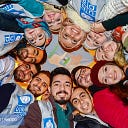Empowering Communities and Building Bridges of Dialogue in Syria
After more than an hour and a half of driving up the steep mountains surrounding the coastal city of Lattakia, a series of quiet small villages, including the A-Dalia and Wadi Al-Qala area, constitute primarily farming terraces and a population of 44,000.
Like the rest of Syria, the area has suffered through more than 12 years of crisis, leaving 90 per cent of the population in poverty. “Even if we have nothing monetary or materialistic to offer, if we look deep inside, there is always something to offer to people around us,” said Salam.
“We received families from all over Syria, from all different ethnic and religious backgrounds. We opened our homes to everyone and accepted them with open arms,” said Labib. “Some families are still residing here, and there were even marriages between people from our village and the newcomers,” added Linda.
Linda, Labib and Salam are members of the Bridges of Dialogue group, which comprises 32 men and women of different ages, and professional and educational backgrounds representing 16 villages that constitute the A-Dalia and Wadi Al-Qala districts. Over a year ago, they received training on non-violent communication, psychological first aid, conflict resolution and advocacy as part of UNDP’s Integrated Area-Based Approach (IABA) in the area.
“Unfortunately, it seems that there was an aggression built-up inside of us,” said Salam. “We are using what we have learned through the programme to try and minimise that feeling that sometimes unintentionally appears in our daily interactions,” she added.
“Each one of us is unique. Our purpose is to become ambassadors of dialogue and compassion. We want to make a difference,” said Linda.
The group meets regularly at the A-Dalia Cultural Centre, which was rehabilitated by UNDP, to develop social activities that reduce tension and encourage means of dialogue. “I took five taxis to get here today. It is not always easy, but when I can afford the time and transportation, it is always worth it,” said Nahla.
The centre also organizes awareness sessions, including those on Gender-Based Violence (GBV) and child marriage. They also organize computer training courses for children and youth in addition to voluntary activities such as cleaning schools and neighbourhoods, afforestation of wildfires affected areas, and entertainment such as theatre and puppet shows. “We announced that we were organizing Zumba summer classes for children. We expected around 30 to 40 children to apply. We were surprised to see the centre packed with 120 children who came to sign up on the day of registration. It was overwhelming in a positive way,” said Yazan.
“Community work and volunteerism is not a foreign concept; our area is primarily agricultural, and farming is about teamwork. No one person can do everything by themselves,” highlighted Linda.
“We do not always see eye to eye on everything, but at least we know now how to negotiate and see each other’s point of view and find a middle ground. If we could not reach a consensus, we cast our votes, and whichever idea wins, everyone accepts it,” said Ammar with a smile.
One of the 16 villages was left without a Mukhtar for 12 years. A Mukhtar is an elected chief official in a town or village who is considered as the person responsible for the administration of and represents the legal entity in a village. The village’s four main families were competing and could not reach an agreement to elect a Mukhtar. “I had separate discussions with the heads of each family using the techniques I have learned from the training. It took a lot of back and forth to bring their points of view close enough to agree on one person,” said Murad proudly. “Moreover, the elected Mukhtar is a younger man, instead of an elderly held post. He is also a person with a disability and can reach out to a sometimes overlooked segment of society,” he added.
“We realize the elderly are somehow set in their own ways, and it is not easy to change how they see things, but we recognise their wisdom and expertise as well as their acceptance and openness to new ideas. It is slow sometimes, but it is happening,” said Ammar.
“Now, the women in my village come to me with their challenges and ask me for advice on how to solve them. Sometimes, I have to personally step in. I must admit, sometimes it is exhausting, but always rewarding,” said Nahla.
The group also recognises the importance of their area’s rich cultural heritage and is working on documenting it for the next generations to come. “We are working on documenting the area’s intangible cultural heritage and recording tales from our elderly. One time, we organised a five-kilometre hike to one of the lesser-known villages where we documented the village landscape and met with the elderly and heard some fascinating stories from them,” said Najla.
The team also includes members from the Women on Action, another UNDP-supported initiative in the area. Dareen, a nurse at the area health centre, collects prescriptions for chronic diseases such as hypertension and diabetes on behalf of the elderly in the 16 villages and distributes them weekly. She also checks on them, ensuring they are doing well and providing psychosocial support when needed.
Salam, Labib, Linda, Nahla, Yazan, Najla, Murad, Dareen and Ammar are all Bridges of Dialogue team members. This initiative is part of UNDP’s Integrated Area-Based Approach (IABA). It places community engagement and priority needs at the centre of interventions, empowering people from mere beneficiaries to active citizens engaged in their sustainable recovery process. In addition, UNDP rehabilitated three schools in the area and a kilometre of sewage network implemented a cash-for-work solid waste management project, supported 50 small businesses, introduced sustainable farming practices, and installed two transforms and solar systems for the main medical centre and six community centres.
By Asma’ Nashawati, Communications Associate, UNDP Syria
